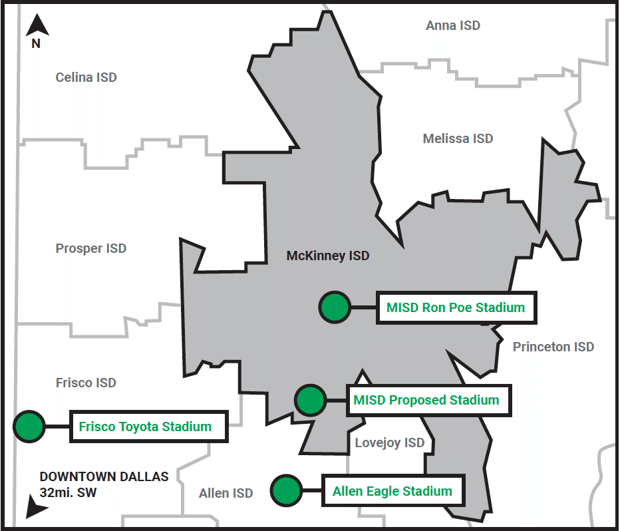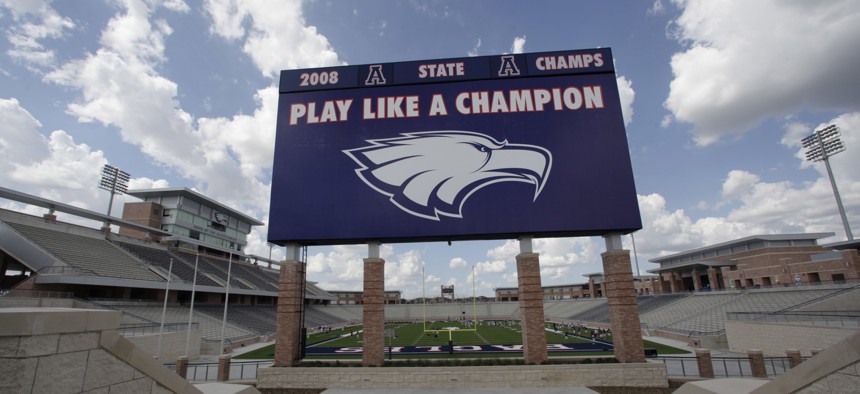Connecting state and local government leaders
Why are these Dallas suburbs funding the most expensive high school football stadiums ever built?
This post is part of a CityLab series on wastelands , and what we squander, discard, and fritter away.
In Texas, the old hands say there are only two seasons: spring football and fall football. But lately there’s a year-round game getting played as well: the competition to build the most expensive high school football stadium in the world.
Football is, of course, a civic religion in Texas, a sport so popular that taxpayers appear willing to pay almost any price to build ever-more spectacular facilities. All around the state, huge new stadiums are springing up, and each project seems to outdo the last, if not in seating capacity, in amenities, flash, and cost. Think more and better training facilities, plusher locker rooms and coaches’ offices, bigger press boxes, special booster club areas, hangar-door-wide scoreboards, and other Texas-size and -style game-day amenities.
The McKinney Independent School District (ISD) stadium, which broke ground in January, topped out its budget at some $80 million (with $7 million recently added to the tally as a result of a spike in the price of concrete). That will make it likely the most expensive nonacademic public school facility ever to be built in the United States.
But McKinney is just the latest entry into what has become a veritable stadium arms race among the fast-growth towns along or near the Route 75 corridor that runs north out of Dallas.
The stadium construction boom has drawn national coverage lately and inspired a joke on late-night TV , but it really kicked off more than a decade ago, when Plano East High’s Tom Kimbrough Stadium opened in 2004 with 9,800 seats and a $20 million price tag. Several more similarly equipped facilities soon followed. Four years ago, the Allen ISD took the competition to the next level when it opened what was at that point the costliest high school stadium ever built: a $72 million facility with 18,000 seats—about the size of a typical NBA arena. (The stadium had to close in 2014 for 15 months and $10 million in repairs after cracks developed in concrete beams.) It features a 38-foot video screen scoreboard.
That might sound impressive, if you don’t play football in nearby Frisco. That town’s ISD and its government ponied up a combined $90 million for the new Ford Center at the Star, the NFL Dallas Cowboys headquarters complex. (Frisco teams already play in the city-owned 20,500-seat Toyota Stadium, which opened in 2005, primarily for use by a professional soccer team.) That money, contributed to what is already estimated to be the world’s most valuable sports franchise, gives Frisco’s four high schools the right to play their games in the Star’s 12,000-seat indoor stadium, one of the Cowboys’ practice fields. The Star claims it has the largest video scoreboard in high school sports.
But not for long: At 55 feet wide, the high-def scoreboard that will crown McKinney’s 12,000-seat stadium, which will sit only three miles from Allen’s, will be bigger than those in all but a few NFL stadiums. The facility will serve teams from McKinney’s three high schools.
The Dallas suburbs vying for Friday Night Lights supremacy. Frisco Toyota Stadium is primarily a pro soccer field, but it’s used by high school teams in the Frisco ISD. (Mark Byrnes/CityLab, info courtesy Curtis Rath )

The money for the McKinney project came as part of a $220 million school bond referendum voters passed overwhelmingly in May 2016 . Although parts of McKinney are poorer, residents’ $83,000 median household income and present relatively low tax rates make the project seemingly affordable. Here’s the rub, though: It’s not even needed. The new stadium, slated for completion for the 2017 season, will replace existing Ron Poe Stadium, which was renovated just 10 years ago at a cost of $10 million. (The district will keep the old stadium, however.) Poe can accommodate 10,000 spectators. In the 2015 football season, the most recent for which attendance figures were available, paying attendees for each of the three high schools’ home games held at Poe did not exceed 12,000 in total, and no game had even 5,000 total spectators on hand. In other words, Poe stadium was never even half full.
Why would relatively small exurban school districts like McKinney build enormous football stadiums that will sit empty most of the year (and are often less than half-full even on game day)?
Part of the answer involves the area’s projected future growth. The town’s population has tripled over the past fifteen years. In the 2000 Census, McKinney had 54,369 residents. The most recent estimate (July 1, 2015) put the population at 162,898. Rick McDaniel, superintendent of the McKinney ISD and a former high school football coach, seems to be confident that the spectacular new McKinney stadium will soon fill up. “We’re visionaries,” he told the Dallas Morning News, and said that the stadium was part of “a vision for McKinney ISD that will propel us forward for a long time.” (His office did not respond to requests for comment for this story.)
The structure of the Texas school system also seems to encourage such infrastructure spending. By law, each ISD board has the power to call referendums when they choose to raise bond money. They act and can raise funds separately from their local municipal governments. But the bond money can go only toward construction and renovation of facilities, acquisition of land, and purchase of equipment, not toward expanding education opportunities for students or paying for teachers. (Texas ranks 38th out of 50 states in per-pupil education spending; in McKinney, per-pupil expenditures totaled $7,345 in 2013 , compared to a national average of $11,841, according to an Education Week analysis of federal data.)
Curtis Rath, a McKinney community activist and blogger on city politics , has been an aggressive critic of this arrangement on his site, Texas Transparency ; there, fans and foes of the McKinney stadium project hotly debate the issue in the comments. Rath argues that firms that stood to benefit from construction projects joined forces with local landowners, contractors, boosters, and school officials to market the benefits of high-profile school structures to McKinney voters. “They sold it by overstating the need for the new stadium,” he says.
Along with the political and business forces pushing to build new facilities for which there may be questionable need, there’s also the “wow” factor. Like many fast-growth Sun Belt communities, the burgeoning municipalities north of Dallas span vast landscapes interlaced by highways, office parks, and new housing developments. With all of these towns scrambling for residents and businesses to move into their new neighborhoods and shopping centers, splashy sports facilities serve as branding tools. McKinney City Manager Paul Grimes says that the new stadium will help him better market the town as it competes with Allen, Frisco, Plano and beyond. “While it is a significant investment,” he says via email, “the stadium will…help to attract visitors and families to our rapidly growing community.”
McKinney superintendent McDaniels echoed that argument when he told the Dallas Morning News , "Regardless from where you're coming from, you'll see the stadium. And that speaks volumes."
NFL fans might recognize that line of reasoning from pro football world, where teams frequently shakedown their host cities for newer and bigger venues in the name of civic pride and bragging rights. Many studies have undercut the economic argument behind public subsidies for professional sports facilities . Mark Conrad, who directs Fordham University’s Gabelli School of Business’s Sports Business Program, doubts that the high school version of this story is any different. The taxpayer dollars going into costly sports facilities are unlikely to generate significant economic benefits. “Without something quantifiable I’m skeptical of such claims,” he says. “There are only a relatively few games that will get played there each year. What do you get from it on the other 300-plus days in the year? All too often promises get made and the facility cannot deliver on them.”
School officials have responded to critics by pointing out that the stadium would also be used for soccer games, band competitions, and some state football games; there’s also the hope that retail and restaurant development will spring up nearby. A high school football stadium serves the community in ways other than just bringing in visitors, business, new residents and more tax dollars. One of them is clearly Texas pride in the game-day spectacle.
“Every one of these giant stadiums has been approved by the voters in a bond issue, so ultimately, the citizens are saying yes to them,” says Greg Tepper, managing editor of Dave Campbell’s Texas Football , a multimedia guide to all things gridiron in the state. “There is obviously at least a little bit of ‘keeping up with the Joneses’ going on, but I believe that these stadiums speak to how seriously Texans take high school football. Is it over the top? Sure. But high school football is over the top in Texas—just the way Texans like it.”
Rath doesn’t think all Texans’ share those priorities. “This is all ego-driven,” he says. “The money could have been spent on a lot of other things to improve academic performance.” He is hoping to promote a slate of candidates to oppose the current ISD board members who floated the stadium bond issue. “Their emphasis should be on the kids and their educational needs,” he says. “Not keeping up with the Joneses.”
When it comes to Texas communities in competition, though, the game is always on.
Marc Wortman is a freelance journalist. This article was originally published by CityLab.

NEXT STORY: Transportation Funding, Scrapping Obama-era Rule Among Federal Priorities for Regionalism Group



